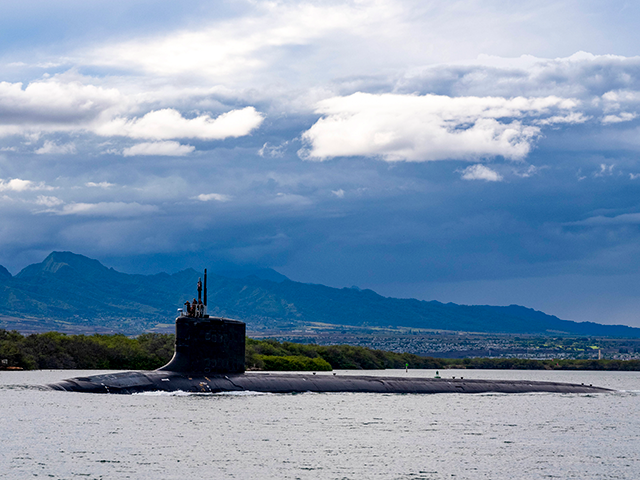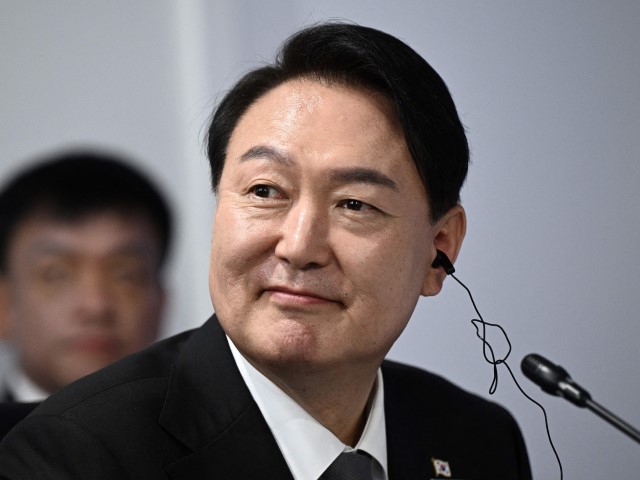President Joe Biden and visiting South Korean President Yoon Suk-yeol on Wednesday signed an agreement that would increase U.S. support for South Korea’s security and give Seoul more input in responses to North Korean aggression.
In exchange, Yoon abandoned his proposal for South Korea to develop its own nuclear weapons.
A major element of the “Washington Declaration,” as the deal has been dubbed, is an agreement for U.S. nuclear submarines to resume docking in South Korea — a practice that was discontinued in the early 1980s. Soon afterward, the United States withdrew all of the nuclear weapons it had stationed in South Korea.
U.S. and South Korean officials said the resumption of submarine docking would be a “very clear demonstration of strength” to deter North Korean aggression. The U.S. also agreed to “better integrate” South Korean military assets into “the alliance’s effort to strengthen deterrence and manage concerns about nuclear non-proliferation in the region.”
The declaration signed by Biden and Yoon created a “nuclear consultative group” (NCG) intended to give Seoul “additional insight in how we think about planning for major contingencies in many respects,” according to a U.S. official.
“This is modeled after what we did with European allies during the height of the Cold War in similar periods of potential external threat,” the official added. “The United States has not taken these steps really since the height of the Cold War with our very closest handful of allies in Europe.”
These measures appear designed to reassure the South Korean public, which has increasingly favored developing nuclear weapons instead of relying on the U.S. for protection. A surprising poll last February found 71 percent of South Koreans in favor of developing their own nuclear weapons to counter North Korea, an idea Yoon floated during his successful presidential campaign.
“The fact that the nuclear-armed North is not a priority for the Biden administration makes the Koreans nervous,” South Korean lawmaker Lee Jae-jung explained on Tuesday ahead of the Biden-Yoon meeting.
In January, Yoon became the first South Korean leader since 1991 to propose building nuclear weapons or invite the United States to station its nuclear missiles on South Korean soil.
“It’s possible that the problem gets worse and our country will introduce tactical nuclear weapons or build them on our own. If that’s the case, we can have our own nuclear weapons pretty quickly, given our scientific and technological capabilities,” Yoon said in January.
Some observers feared the U.S.-South Korea relationship would be damaged by the alleged leak of classified material American corporate news outlets revealed this month, resulting in at least one known arrest. Some of the allegedly leaked documents suggested U.S. intelligence agents were eavesdropping on senior South Korean officials as they grumbled about pressure from Washington to supply Ukraine with munitions. The South Korean government responded to the news at the time by stating that some of the documents in question were “forged,” without specifying which.
Yoon and his officials publicly dismissed the importance of the leak and questioned the authenticity of the intercepts, while his political rivals in South Korea needled him for relocating his office and creating security vulnerabilities that could have made U.S. wiretapping possible.
“I believe that this matter is no reason to shake the ironclad trust that supports the U.S.-South Korea alliance, because it is based on shared values like freedom,” Yoon said on Monday.
President Joe Biden and South Korea’s President Yoon Suk Yeol shake hands after a news conference in the Rose Garden of the White House Wednesday, April 26, 2023, in Washington. (AP Photo/Andrew Harnik)
Speaking to reporters on Wednesday from the White House, Biden and Yoon made no reference to the leaked documents, instead praising the strength of the U.S.-South Korea relationship.
Biden said America’s long friendship with South Korea was the “linchpin of regional security and prosperity,” while Yoon hailed it as an “everlasting partnership” based on “shared universal values of freedom and democracy.”
“We’re doubling down on our cooperation as allies even as the DPRK [North Korea] ramps up its challenges,” Biden said.
Biden sought to reassure South Korea by stressing that “a nuclear attack by North Korea against the United States or its allies, or partisans, or partners is unacceptable and will result in the end of whatever regime were to take such an action.”
Go Myong-hyun of the Asan Institute for Policy Studies in Seoul told Voice of America News (VOA) on Wednesday that the Washington Declaration would boost Yoon’s political profile at home since it pledged more deployment of American military assets and gave South Korea more influence over joint defense policy.
Go thought today’s agreement could eventually be followed up by a “dedicated nuclear submarine option,” a permanent deployment to South Korea.

